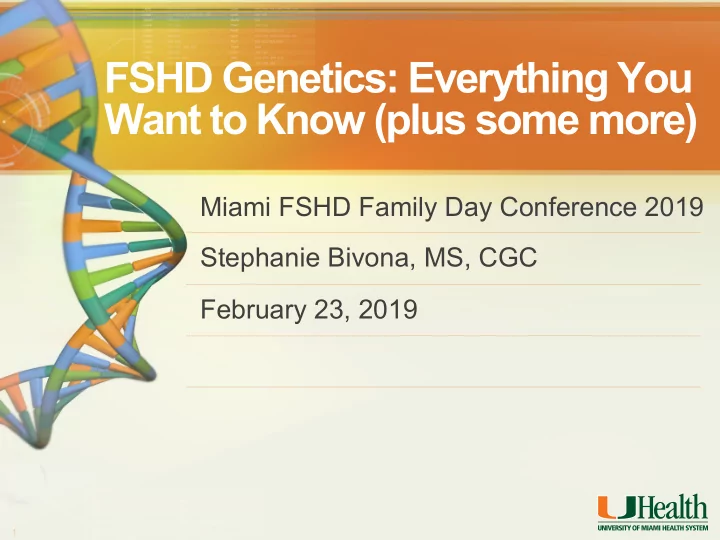

FSHD Genetics: Everything You Want to Know (plus some more) Miami FSHD Family Day Conference 2019 Stephanie Bivona, MS, CGC February 23, 2019 1
What is a genetic counselor? § Genetic counselors have a Master degree in human genetics and/or genetic counseling § Trained to be a resource for both patients and doctors about genetic concepts § We are involved in ordering genetic tests and disclosing these results 2
Genetics 101 3
4
FSHD § FSHD1 vs FSHD2 § The main difference is underlying genetic cause § The symptoms of each are the same § FSHD1 makes up 95% of FSHD cases 5
Basic Genetics of FSHD1 § Autosomal dominant § If an individual has the condition, they have a 50% chance of passing it on. Source: https://www.genomicseducation.hee.nhs.uk 6
Basic Genetics of FSHD1 § Autosomal dominant § If an individual has the condition, they have a 50% chance of passing it on § 10-25% of cases are de novo § The affected individual is the first person in their family to have the contraction § This is one of the reasons why a person can have FSHD without a family history for the condition 7
Other reasons why FSHD might “skip” generations § Variable expressivity § Not all individuals in the family will have the same symptoms of FSHD § Possible incomplete penetrance § A small percentage of people who have the genetic mutation for FSHD do not ever show signs of FSHD § FSHD2 § We will get to this later. 8
What actually causes FSHD? § The expression (presence) of the DUX4 protein § This protein should NOT be present in our skeletal muscles § The D4Z4 region helps prevent DUX4 when it is “methylated” § FSHD is due to a hypomethylation of the D4Z4 region DUX4=TOXIC 9
The normal D4Z4 region-No FSHD X Adapted from Fig 2. Lek et al., 2015, Trends in Molec. Med. 10
FSHD1 mechanism § Contraction of the D4Z4 region § Under 11 repeats § Hypomethylation of the D4Z4 region § “Permissive allele” § 4qA § Allows for DUX4 to remain stable 11
FSHD1 Mechanism The addition of this “Poly (A)” leads to methylation-allows DUX4 to be made and survive Adapted from Fig 2. Lek et al., 2015, Trends in Molec. Med. 12
D4Z4 contractions without FSHD Without the addition of the “Poly (A)” - DUX4 is not stable and is broken down, even with less than 11 repeats Adapted from Fig 2. Lek et al., 2015, Trends in Molec. Med. 13
Back before FSHD2 things were so easy… https://www.smu.edu.sg/ 14
Why is FSHD2 so complicated? § Digenic inheritance! 15
What is digenic inheritance? § When two different genes or genetic components are needed in order to have a genetic condition § In the case of FSHD2 the two components needed for hypomethylation of D4Z4: § A mutation in the SMCHD1 gene § A “permissive” D4Z4 allele 16
FSHD2 Mechanism § Permissive allele § 4qA § Only one is needed § Mutation in the SMCHD1 gene § Only 1 copy of the gene needs a mutation 17
FSHD2 mechanism Adapted from Fig 2. Lek et al., 2015, Trends in Molec. Med. 18
How do we test for FSHD? Test confirms contraction-diagnosed with FSHD1 SMCHD1 mutation found-confirm Test for FSHD1 (look permissive allele- for contraction on the diagnosed with FSHD2 4qA allele) Contraction is not there-sequence SMCHD1 No SMCHD1 mutation-patient probably has a different condition 19
Who else in the family is at risk? § FSHD1 § First degree relatives have a 50% chance § FSHD2 § 50% chance the SMCHD1 mutation will be passed on § Multiply this by the chance that 4qA permissive allele will be passed on 20
Who is at risk for FSHD1? 50% 21
Who is at risk for FSHD1? 25% 22
Who is at risk for FSHD1? 12.5% 23
Now what are the risks for FSHD1? 50% 24
What chance do her kids have for FSHD2? A B A B 25
Affected parent A B A A A A B Unaffected B B A B B ¾ (75%) chance child will get permissive allele 26
In this scenario § 1/2 x 3/4 = 3/8 chance child will have FSHD A B A B 27
Affected parent A B B B A B B Unaffected B A B B B ½ (50%) chance child will get permissive allele 28
In this scenario § 1/2 x 1/2 = 1/4 chance child will have FSHD B B A B 29
Family planning options for FSHD § Conceive naturally § No testing § Conceive naturally § Test the fetus for FSHD § Amnio and CVS § In vitro fertilization with preimplantation genetic testing § Adoption, sperm/egg donation, etc. 30
IVF with Preimplantation Genetic Testing- FSHD1 § Go through the IVF procedure § Once embryos are obtained they are tested for FSHD contraction § Lab may ask for samples from additional family members § Those embryos that test negative for FSHD are implanted § Cons § Cost § No guarantee https://www.iasoivf.com 31
IVF with Preimplantation Genetic Testing- FSHD2 § Go through the IVF procedure § Once embryos are obtained they are tested for SMCHD1 mutation § Lab may ask for samples from additional family members § Those embryos that test negative for SMCHD1 are implanted § Cons § Cost § No guarantee https://www.iasoivf.com 32
How can I or someone else be tested for FSHD? § www.nsgc.org/findageneticcounselor § Consult a neurologist 33
Thank you! Stephanie Bivona, MS, CGC Phone: (305) 243-9461 Email: sbivona@med.miami.edu 34
Recommend
More recommend